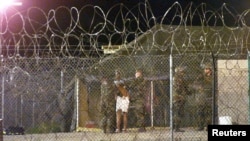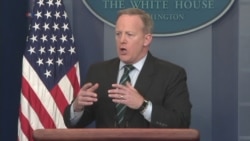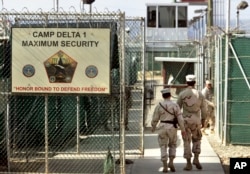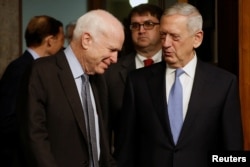Confusion reigned in Washington on Wednesday about a purported draft executive order suggesting that President Donald Trump may review how America interrogates suspected terrorists and could reopen secret "black site" prisons outside the United States.
The New York Times and The Associated Press both reported they had copies of the document, which was said to be circulating among top administration officials.
But White House spokesman Sean Spicer insisted that the draft “is not a White House document.’’ He offered no further explanation or any theory about its author.
WATCH: Spicer on enhanced interrogation
The supposed presidential order would keep open the U.S. prison at Guantanamo Bay, Cuba, where 41 suspected terrorists are still held.
Former President Barack Obama failed to keep his promise to close the facility. He contended that operation of the prison — where the Central Intelligence Agency used so-called "enhanced interrogation" in questioning suspects until Obama banned it — served as a recruiting tool for Islamic State terrorists.
Obama also closed the "black site" prisons, which had been run by the CIA.
Trump believes ‘torture works’
During his campaign for the White House, Trump endorsed bringing back waterboarding, a harsh interrogation method that simulates drowning, which Obama banned and now is prohibited by U.S. law.
“Absolutely I feel it works,” Trump said in an interview with ABC News Wednesday.
He said he has spoken with people at high levels in the intelligence community who agree, and that as far as he is concerned, “We have to fight fire with fire.”
His Defense Secretary James Mattis has said torturing suspecting terrorists is unlikely to prevent future attacks. Trump said in the interview he will rely on the judgment of Mattis and CIA Director Mike Pompeo.
“If they don’t want do it, then that’s fine,” he said.
Even if Mattis were to believe that torture is an effective interrogation tool, former State Department official P.J. Crowley told VOA that Trump faces a "formidable legal and political obstacle," because the U.S. Army Field Manual clearly outlaws torture.
"This will be an area where political instinct will confront political reality and operational experience," Crowley told VOA's national security correspondent, Jeff Seldin. "I'm highly skeptical the executive order that is suggested is necessarily going to result in a dramatic change in U.S. law or U.S. approach."
Crowley said having both an intelligence team and a law enforcement team interview suspected terrorists has proven to be much more effective than using torture and harsh incarceration in "black site" secret prisons.
Guantanamo to stay open
Trump also has vowed to keep the Guantanamo detention center.
"We're gonna load it up with some bad dudes," he said during his campaign for the presidency. "Believe me, we're gonna load it up."
The supposed draft executive order, as described in media accounts, calls for top national security officials to "recommend to the president whether to reinitiate a program of interrogation of high-value alien terrorists to be operated outside the United States and whether such program should include the use of detention facilities operated" by the CIA, which the U.S. spy agency controlled after the 2001 al-Qaida terrorist attacks on New York and Washington.
The CIA is believed to have run the clandestine prisons in Iraq, Lithuania, Thailand, Romania, Afghanistan and Poland.
News organizations said the document says U.S. laws should be obeyed at all times and explicitly rejects "torture."
Trump's presumed reconsideration of extreme types of interrogation drew an immediate rebuke from Arizona Senator John McCain.
The unsuccessful 2008 Republican presidential candidate was a U.S. naval pilot who was captured by North Vietnam in the 1960s and held as a prisoner of war for more than five years.
"The president can sign whatever executive orders he likes," McCain said. "But the law is the law. We are not bringing back torture in the United States of America."
McCain said he had been assured by defense chief Mattis and new CIA Director Mike Pompeo that they would adhere to the Army Field Manual's limits on interrogation of terrorist suspects.








